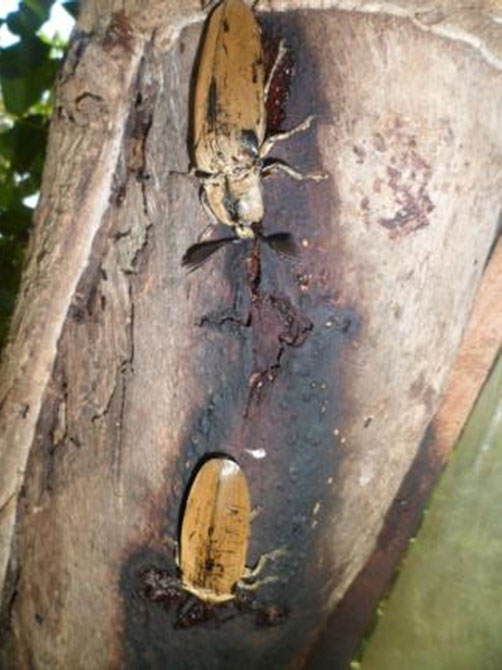Yvonne Tete Cakpo, M.Sc
Yvonne Tete Cakpo, M.Sc.
University of Freiburg
Biology I, Evolution & Ecology
Hauptstraße 1, Room 1040
D-79104 Freiburg
Phone. ++49/761/203-2582
E-Mail: catyan5@yahoo.fr
“Diversity of xylophagous pests of debarked medicinal plants in Benin”
CV
- 1998: high school diploma. Bohicon I Secondary School. Bohicon, Republic of Benin.
- 10/1999 - 9/2003: Environmental Engineering Diploma. Environmental Restoration and Protection. Polytechnic College. University of Abomey-Calavi. Cotonou, Republic of Benin.
- 9/2003: Engineering thesis: Dead wood and saproxylic beetle assemblages in a semi-deciduous forest in Southern Benin.
Supervisor: Prof. Brice Sinsin. University of Abomey-Calavi - 10/2003 – 10/2005: Master of Science. Environmental Resources Restoration and Management. Faculty of Agronomic Sciences. University of Abomey-Calavi. Cotonou, Republic of Benin.
Master thesis: Agronomic and social economic evaluation of agroforestry systems in southern Benin: The case of the UNIHO project in Hêvié and Hayakpa.
Supervisors: Prof. Brice Sinsin and Dr. Anne Floquet. University of Abomey-Calavi - Since 2012: PhD student “Diversity of xylophagous pests of debarked medicinal plants in Benin”.
Supervisors: Prof. Judith Korb (Germany) and Prof. Brice Sinsin (Benin)
Research
In tropical forest, resources such as leaves, fruits or bark are subject of overexploitation since they are used as traditional medicine. These anthropogenic pressures on plants have negative consequences on their survival because debarking consist a source of entry for xylophagous infection and that could lead to tree death. This research aims at studying the diversity of xylophagous pest insects which attack trees after bark harvesting to determine the mains factors influencing pest attack. The study is done in two kinds of ecosystems in Benin (West Africa): a natural forest ecosystem in which heavy bark exploitation occurs and in agroforestry system.
Methods
- Ethnobotanical surveys to identify the most medicinal plant harvested in Southern Benin
- Tree-trap set up (interception trap and emergence trap) to collect wood-borers and their natural enemies.
- Gas chromatography and mass spectrometry analysis to identify chemical plants compounds potential involved in attracting insects after bark harvesting
Photo 2 : Interception trap Photo 3 : Emergence trap set-up
Seminars
- 2007
Training on Database management. West African Biodiversity Data Network. Frankfurt, Germany. - 2010
Training on longicorn beetle taxonomy in Royal Institut on Natural Science. Brussels, Belgium.
Meetings and workshops
- 2003
Dead wood and saproxylic beetle assemblages in a semi-deciduous forest in Southern Benin. Biolama; workshop on biology diversity in Lama Protected Forest. IITA, Benin. - 2008
Presentation of vegetal Data base of Benin. Workshop on phyto-sociological database management. Ouagadougou, Burkina-faso. - 2010
Symposium theme: Entomology in Belgium. Royal Belgian Entomological Society. Belgium. - 2012
Useful plant in Rural South Benin. Workshop ABEPA, Benin.
Publications
- Djego, J., Djego-Djossou, S., Cakpo, Y., Agnani, P., Sinsin, B. 2011. Evaluation du potentiel ethnobotanique des populations rurales au Sud et au centre du Bénin. Int. J. Biol. Chem. Sci. 5(4): 1432-1447.
- Lachat T, Nagel P, Cakpo Y, Attignon S, Goergen G, Sinsin B, Peveling R, 2006 b. Dead wood and saproxylic beetle assemblages in a semi-deciduous forest in Southern Benin. Forest Ecology and Management, 225(1-3): 27-38.


